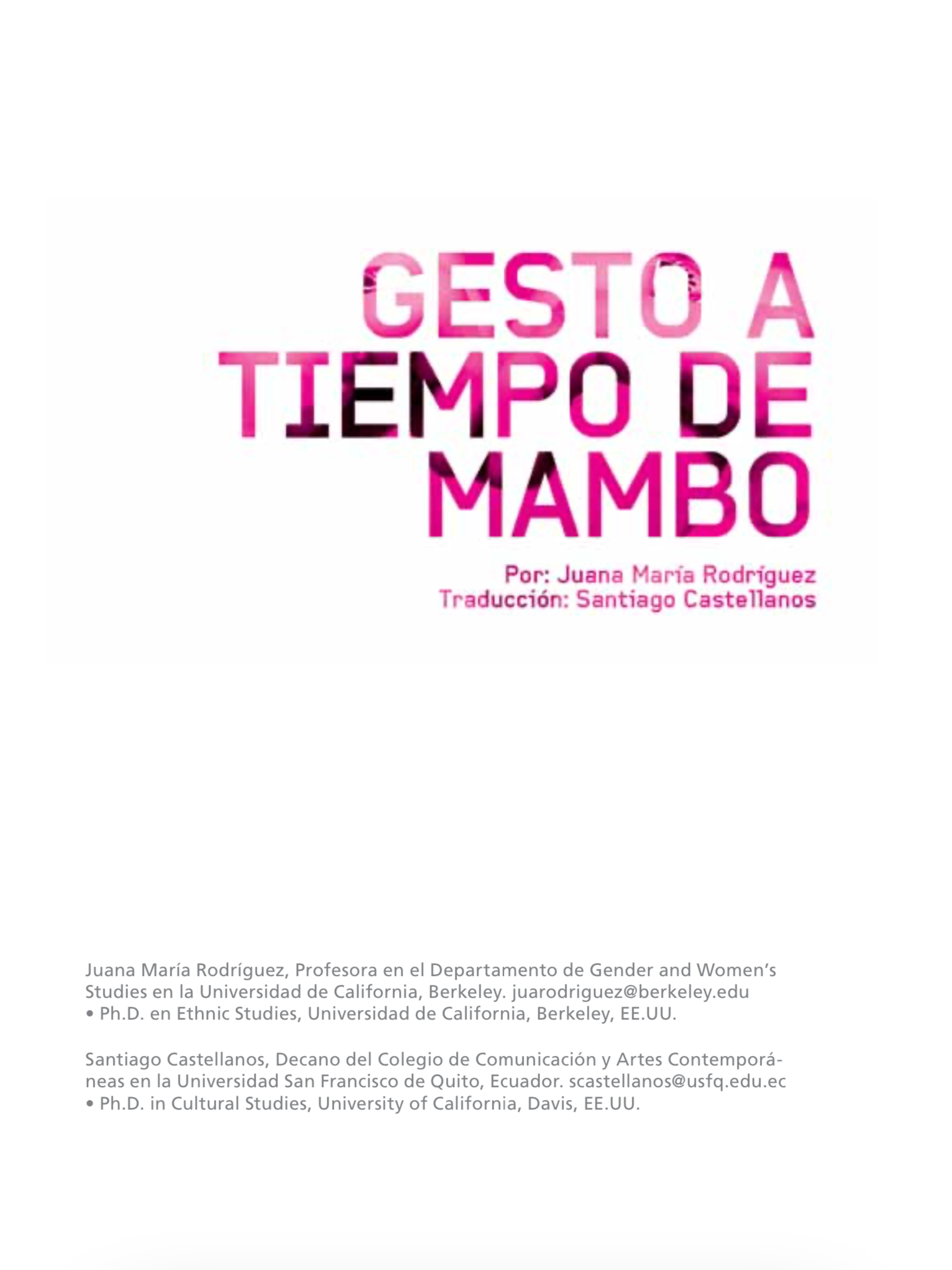
Published 2016-08-01
Keywords
- performance,
- gesture,
- time,
- music,
- dance
- memory ...More
How to Cite
Copyright (c) 2016 Juana María Rodríguez; Santiago Castellanos

This work is licensed under a Creative Commons Attribution-NonCommercial 4.0 International License.
Abstract
To write about gesture is to engage that which exceeds language through language, to reach out to touch figures in motion that are no longer there, to capture in static black and white marks the scent of a body that has left no trace. To write about gesture requires, to borrow Peggy Phelan"™s iconic phrase, "representation without reproduction" (Unmarked146). Rather than emphasize inscription, Phelan points us to "the possibility that something substantial can be made from the outline left after the body has disappeared." Her "hunch is that the affective outline of what we"™ve lost might bring us closer...
Downloads
References
- Agamben, G. (2000). Means without Ends: Notes on Politics. Minneapolis: University of Minnesota Press. Traducido al castellano por Antonio Gimeno Cuspinera (2001) como Medios Sin Fin: Notas sobre la Política. Valencia: Pre-Textos.
- Agamben, G. (1999). Potentialities: Collected Essays in Philosophy. Stanford: Stanford University Press.
- Ahmed, S. (2004). The Cultural Politics of Emotion. New York: Routledge. Traducido al castellano como La Política Cultural de las Emociones (2015). México: UNAM.
- Alexander, M.J. (2005). Pedagogies of Crossing: Meditations on Feminism, Sexual Politics, Memory, and the Sacred. Durham: Duke University Press.
- Allen, J.S. (2009). "For "˜the Children"™: Dancing the Beloved Community." Souls: A Critical Journal of Black Politics, Culture and Society 11.3: 311-26.
- Allen, J.S. (2011). ¡Venceremos? The Erotics of Black Self-Making in Cuba. Durham: Duke University Press.
- Barthes, R. (1977). Image, Music, Text. New York: Hill and Wang.
- Butler, J. (2004). Undoing Gender. New York: Routledge. Traducido al castellano por Patricia Soley Beltrán como Deshacer el Género (2006). Barcelona: Paidós.
- Cassell, H. (2010). "Party Promoter Chantal Salkey Dies." Bay Area Reporter, 28 de enero de 2010. http://bit.ly/dRFI7X. Acceso: 22 de Mayo 2012.
- Corey, F.C. & Nakayama, T.K. (1997). "Sextext." Text and Performance Quarterly 17.1: 58-68.
- Cvetkovich, A. (2003). An Archive of Feelings: Trauma, Sexuality, and Lesbian Public Cultures. Durham: Duke University Press.
- De la tierra, t. (2002). For the Hard Ones: A Lesbian Phenomenology / Para las duras: Una fenomenología lesbiana. San Diego: Calaca.
- Delgado, C. F. & Muñoz, J. E. (1997). "Rebellions of Everynight Life." En C. F. Delgado y J. E. Muñoz (Eds.), Everynight Life: Culture and Dance in Latin/o America (pp. 9-32). Durham: Duke University Press.
- Derrida, J. (1996). Archive Fever: A Freudian Impression. Chicago: University of Chicago Press. Traducido al castellano por Paco Vidarte como Mal de Archivo: Una Impresión Freudiana (1997). Madrid: Trotta.
- Desmond, J. C. (1997). "Embodying Difference: Issues in Dance and Cultural Studies." En C. F. Delgado y J. E. Muñoz (Eds.), Everynight Life: Culture and Dance in Latin/o America (pp.33-64), Durham: Duke University Press.
- Fanon, F. (1973). Piel Negra, Máscaras Blancas. Trad. Ángel Abad. Buenos Aires: Abraxas.
- Foucault, M. (1972). The Archaeology of Knowledge. London: TAvistock. Traducido al castellano por Aurelio Garzón del Camino como La Arqueología del Saber (1970). Buenos Aires: Siglo Veintiuno Editores.
- Foucault, M. (1978). The History of Sexuality. Vol. 1. Trad. Robert Hurley. New York: Vintage. Traducido al castellano por Ulises Guiñazú como La Historia de la Sexualidad 1: La Voluntad de Saber (1977). Buenos Aires: Siglo Veintiuno Editores.
- Foucault, M. (1989). "Sexual Choice, Sexual Act." En S. Lotringer (Ed.), Foucault Live: Collected Interviews, 1961-84 (pp.211-31). New York: Semiotext(e).
- Gopinath, G. (2005). Impossible Desires: Queer Diasporas and South Asian Public Cultures. Durham: Duke University Press.
- Halberstam, J. (1998). Female Masculinity. Durham: Duke University Press. Traducido al castellano por Javier Sáez como Masculinidad Femenina (2008). Barcelona: Egales.
- Hannabach, C. (2007). "Anxious Embodiment, Disability, and Sexuality: A Response to Margrit Shildrick." Studies in Gender and Sexuality 8.3, 253-61.
- Merleau-Ponty, M. (2002). Phenomenology of Perception. New York: Routledge.
- Muñoz, J. E. (2009). Cruising Utopia: The Then and There of Queer Futurity. New York: New York University Press.
- Muñoz, J. E. (2001). "Gesture, Ephemera and Queer Feeling: Approaching Kevin Aviance." En J. Desmond (Ed.), Dancing Desires: Choreographing Sexualities On and Off Stage (pp. 423-42). Madison: University of Wisconsin Press.
- Noland, C. (2009). Agency and Embodiment: Performing Gestures/Producing Culture. Cambridge: Harvard University Press.
- Nguyen, H. T. (2009). "A View from the Bottom: Gay Asian American Masculinity and Sexu-al Representation." PhD diss., University of California-Berkeley, 2009.
- Peñalosa, D. (2009). The Clave Matrix: Afro-Cuban Rythm, Its Principles and African Ori-gins. Redway: Bembe Books.
- Phelan, P. (1997). Mourning Sex: Performing Public Memories. New York: Routledge.
- Phelan, P. (1993). Unmarked: The Politics of Performance. New York: Routledge.
- Povinelli, E. A. (2002). "Notes on Gridlick: Genealogy, Intimacy, Sexuality." Public Culture 14.1: 215-38.
- Rivera-Servera, R.H. (2011). "Choreographies of Resistance: Latino Queer Dance and the Utopian Performative." En M. R. Hames-García y E. J. Martínez (Eds.), Gay Latino Studies: A Critical Reader (pp. 259-80). Durham: Duke University Press.
- Salamon, G. (2010). Assuming a Body: Transgender and Rhetorics of Materiality. New York: Columbia University Press.
- Savigliano, M. (1995). Tango and the Political Economy of Passion. Boulder: Westview.
- Stern, L. (2008). "Ghosting: the Performance and Migration of Cinematic Gesture, Focusing on Houd Hsiao-Hsien"™s Good Men, Good Women." En C. Noland y S. A. Ness (Eds.), Migrations of Gesture (pp. 185-215). Minneapolis: University of Minnesota Press.
- Tinsley, O. N. (2010). Thiefing Sugar: Eroticism between Women in Caribbean Literature. Durham: Duke University Press.
